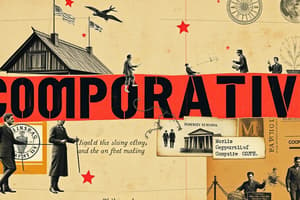Podcast
Questions and Answers
What is the title of the act known as Republic Act No. 9520?
What is the title of the act known as Republic Act No. 9520?
Philippine Cooperative Code of 2008
What is the declared policy of the State regarding cooperatives?
What is the declared policy of the State regarding cooperatives?
- To regulate private sector involvement
- To hinder the growth of cooperatives
- To foster the creation and growth of cooperatives (correct)
- To privatize cooperative services
What are cooperatives recognized as?
What are cooperatives recognized as?
Autonomous and duly registered association of persons
Which of the following is NOT a cooperative principle?
Which of the following is NOT a cooperative principle?
Members of a cooperative have unequal voting rights.
Members of a cooperative have unequal voting rights.
The principle of __________ recognizes that cooperatives must regulate within their ranks.
The principle of __________ recognizes that cooperatives must regulate within their ranks.
What do cooperatives allocate surpluses for?
What do cooperatives allocate surpluses for?
Flashcards are hidden until you start studying
Study Notes
Philippine Cooperative Code of 2008
- Amends the "Cooperative Code of the Philippines" (Republic Act No. 6938)
- Aims to foster the creation and growth of cooperatives, promoting self-reliance and economic development
- Recognizes the principle of subsidiarity: cooperatives initiate and regulate their own promotion, organization, training, research, audit, and support services with government assistance when necessary
General Concepts and Principles
- A Cooperative is a registered, autonomous association of individuals with shared interests, voluntarily coming together to achieve social, economic, and cultural needs through contributions, patronizing products and services, and accepting a fair share of risks and benefits.
Cooperative Principles
- Voluntary and Open Membership: Open to all, regardless of gender, social, racial, cultural, political, or religious background, who can use the services and accept membership responsibilities.
- Democratic Member Control: Controlled by members who actively participate in decision-making. Members have equal voting rights.
- Member Economic Participation: Members contribute capital, receive limited compensation or interest on capital, and allocate surpluses for cooperative development, member benefits, and approved activities.
- Autonomy and Independence: Autonomous organizations controlled by their members, entering into agreements with other organizations, including government agencies, while maintaining independence and control over their own affairs.
- Education, Training, and Information: Cooperatives educate and train members, leaders, and officers about cooperative principles and practices.
- Cooperation Among Cooperatives: Cooperatives work together at local, national, regional, and international levels to achieve common goals and meet member needs.
- Concern for Community: Cooperatives contribute to the development of their communities through social, economic, and cultural activities.
Studying That Suits You
Use AI to generate personalized quizzes and flashcards to suit your learning preferences.




